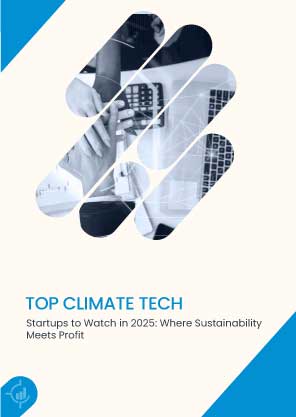or call: +1 (845) 347-8894

or call: +1 (845) 347-8894

The year 2025 is going to be very important for climate technology. In 2024, investors put a record $76 billion into new companies focused on helping the planet, according to PwC. This shows not only their hope for the future but also the growing need to bring eco-friendly solutions to more people and places.
What makes 2025 special is the big change in how people see climate tech. It’s not just about lowering pollution anymore. It’s now about building strong, growing businesses that help the environment and create new business chances. For startup founders and tech leaders, the message is clear. Making money and helping the planet are now happening together, and it’s moving fast. Below is a list of companies that aren’t just coming up with cool ideas, they’re building cleaner systems, protecting the planet, and creating smart ways to grow. The tech world needs to pay attention.
Climate tech refers to technologies that help reduce greenhouse gas emissions or adapt to the effects of climate change. This includes innovations across clean energy, sustainable agriculture, carbon capture, green mobility, and more. From carbon-negative cement to hybrid-electric planes, startups are reshaping entire industries by embedding sustainability into business models. The following US-based companies are not only solving environmental challenges but also creating growth opportunities. These are the climate tech startups to watch as sustainability becomes a core business strategy, not just a moral imperative.
Heirloom employs limestone to remove CO2 straight from the air through direct air capture. In 2024, it became the inaugural carbon removal startup to ship carbon credits to large corporate purchasers under the Frontier fund. Funded by Bill Gates’ Breakthrough Energy and Stripe, its solution is cost-effective and scalable. With growing regulatory pressure in 2025, Heirloom’s strategy is very much in line with SEC reporting rules and corporate net-zero commitments. It provides a commercially plausible way for companies to cancel out emissions without the use of intangible offsets, and so it is a favorite of climate accountability.
Twelve transform CO2 into important industrial chemicals such as jet fuel, plastics, and detergents instead of petroleum as feedstock. In 2025, they are continuing to build commercial partnerships with Shopify and Mercedes-Benz, showcasing real-world applications. Twelve shows that carbon is not only a burden, it’s an asset. Their technology converts emissions into inputs, presenting manufacturers with a new avenue to circular manufacturing. Waste-to-value helps drive supply chain decarbonization and opens new revenue streams for industrial producers focused on sustainability.
Spun out of MIT, Verdox employs electro-swing adsorption to remove CO2 with very little energy input. In 2024, it raised $80 million from Bill Gates’ Breakthrough Energy and has since tested its tech with aluminum and cement manufacturers. Heavy industry is one of the toughest sectors to decarbonize, and Verdox provides a plug-and-play solution for heavy emitters seeking to reduce costs and meet Scope 1 requirements. Its energy-efficient design also minimizes operational costs, making it a commercially viable solution for building retrofitting for climate performance.
Unlike conventional carbon capture plants, Noya places compact modular units on commercial rooftops, which transform buildings into active climate solutions. The captured CO2 is marketed to customers in the food and beverage sectors. Noya democratizes carbon capture by allowing building owners to earn returns through sustainability. With cities under stress to achieve decarbonization targets, this rooftop-capable model provides a decentralized solution to help address the climate while generating new sources of revenue from available real estate holdings.
Planet A Foods has developed a cocoa-free chocolate, ChoViva, using fermentation. With cacao supply chains under pressure due to deforestation and climate risks, their product reduces emissions by over 90%. ChoViva is now found in over 1,000 European retailers and is entering the US market, giving food giants a real alternative that aligns with ESG goals. This innovation supports sustainable food sourcing and addresses consumer demand for ethical, climate-conscious products.
Brimstone produces carbon-negative cement from calcium silicate rock, replacing limestone, a major source of CO2 in conventional cement. They received government contracts and Series B funding in 2024. Cement contributes 8% of global emissions, and Brimstone enables cities and developers to achieve green building requirements without compromising on material strength or cost. With construction activity taking off in climate-exposed areas, such solutions are critical to the achievement of resilient infrastructure targets.
Ampaire retrofits planes with hybrid-electric systems. In 2025, it starts commercial operations on regional US routes, saving up to 70% of fuel consumption. Sustainable aviation is no longer theoretical. Ampaire brings it into reality, decreasing carbon emissions for cargo and passenger carriers. Their solution offers a short-term fix for airline operators struggling with growing pressure from regulators and environmentally savvy travelers to go green with aviation.
Pivot Bio substitutes synthetic nitrogen fertilizer with microbial alternatives that naturally fix nitrogen in soil. Its product is applied to more than 5 million acres of cropland. Agriculture contributes more than 10% of US greenhouse gas emissions, and Pivot Bio facilitates yield expansion with decreased runoff and emissions. It also makes farmers less dependent on fickle fertilizer markets, introducing an element of economic resilience to their sustainability strategy.
Remora sequesters carbon emissions straight from the tailpipes of semi-trucks, holding it onboard for subsequent sequestration or use. Supported by Amazon’s Climate Pledge Fund and Y Combinator, Remora is ready to revolutionize one of the filthiest transport niches. Trucking continues to be a recalcitrant source of emissions, and Remora’s retrofitting solution provides a bridge tactic as the sector shifts towards electrification.
Crusoe Energy repurposes excess natural gas from oil fields, typically flared into the atmosphere, to power modular data centers for AI and blockchain. By turning waste energy into productive compute, Crusoe lowers emissions and supports low-carbon digital infrastructure. In 2025, it’s expanding operations across the US, aligning energy efficiency with tech demand.
The common thread across these top climate tech startups is a pivot from experimentation to execution. They’re commercializing technologies once confined to labs and aligning them with real-world economics. This marks a broader evolution of the climate tech market: From policy-driven to profit-oriented, these companies aren’t surviving on subsidies alone. They have viable business models with enterprise customers, government partners, and repeatable revenue. From local to scalable, their solutions can be replicated across geographies, sectors, and infrastructures. From awareness to accountability, with ESG reporting becoming mandatory in multiple regions, corporations are under pressure to deploy real solutions, not just marketing claims.
The climate tech sector offers more than feel-good investments. It presents hard business cases for industries looking to decarbonize, digitize, and differentiate. For tech leaders, aligning your solutions with climate-forward startups can accelerate innovation pipelines, tap into sustainability budgets, and future-proof offerings. For investors, 2025 is about going beyond greenwashing. The startups worth watching aren’t just pitching climate missions. They’re building platforms that deliver measurable impact and financial upside.
These ten climate tech startups show the transition to a climate-smart economy. They’re doing what once seemed impossible: making sustainability profitable. As more enterprises include climate goals in their strategic roadmaps, these startups are not just participants; they are catalysts. In 2025 and beyond, the winners in tech will be those who see climate innovation not as compliance, but as a competitive advantage. Stay ahead. Invest in what’s next because climate tech is no longer a side bet. It’s the main game.
Climate tech refers to technologies that reduce greenhouse gas emissions or address the effects of climate change across sectors like energy, agriculture, transportation, and manufacturing.
In 2025, climate tech startups are scaling commercially viable solutions that align with both sustainability goals and profitability, attracting enterprise adoption and investor interest.
Today’s US startups focus on measurable impact, not just green messaging. They offer scalable models, strong revenue potential, and support ESG mandates across industries.
Sectors such as aviation, cement, agriculture, logistics, and manufacturing directly benefit from climate tech through emissions reduction, cost savings, and improved supply chain resilience.
They offer strategic advantages, unlocking new revenue, accelerating innovation, and aligning with emerging regulatory and sustainability trends.
To participate in our interviews, please write to our IntentTech Media Room at sudipto@intentamplify.com




